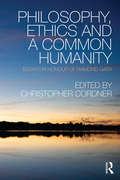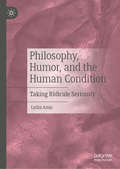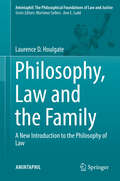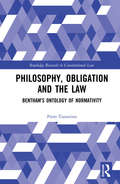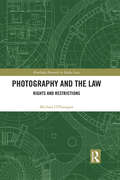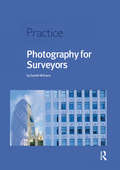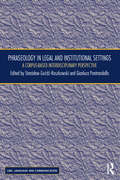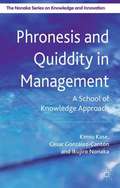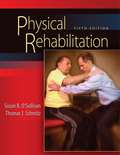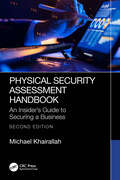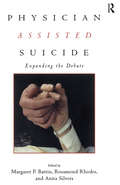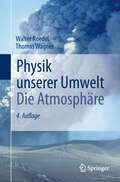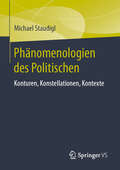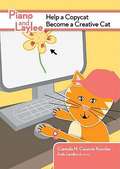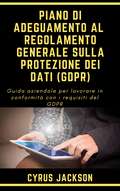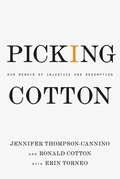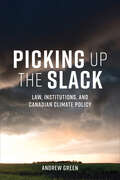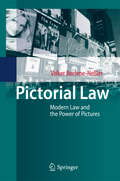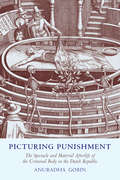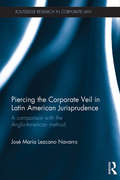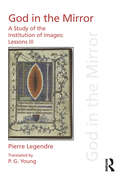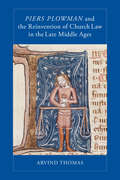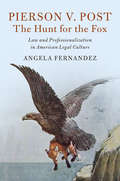- Table View
- List View
Philosophy, Ethics and a Common Humanity: Essays in Honour of Raimond Gaita
by Christopher CordnerThe work of Raimond Gaita, in books such as Good and Evil: An Absolute Conception, A Common Humanity and The Philosopher’s Dog, has made an outstanding and controversial contribution to philosophy and to the wider culture. In this superb collection an international team of contributors explore issues across the wide range of Gaita’s thought, including the nature of good and evil, philosophy and biography, the unthinkable, Plato and ancient philosophy, Wittgenstein, the religious dimensions of Gaita’s work, aspects of the Holocaust, and aboriginal reconciliation in Australia.
Philosophy, Humor, and the Human Condition: Taking Ridicule Seriously
by Lydia AmirThis book presents an original worldview, Homo risibilis, wherein self-referential humor is proposed as the path leading from a tragic view of life to a liberating embrace of human ridicule. Humor is presented as a conceptual tool for holding together contradictions and managing the unresolvable conflict of the human condition till Homo risibilis resolves the inherent tension without epistemological cost. This original approach to the human condition allows us to effectively address life’s ambiguities without losing sight of its tragic overtones and brings along far-ranging personal and social benefits.By defining the problem that other philosophies and many religions attempt to solve in terms we can all relate to, Homo risibilis enables an understanding of the Other that surpasses mere tolerance. Its egalitarian vision roots an ethic of compassion without requiring metaphysical or religious assumptions and liberates the individual for action on others’ behalf. It offers a new model of rationality which effectively handles and eventually resolves the tension between oneself, others, and the world at large. Amir’s view of the human condition transcends the field of philosophy of humor. An original worldview that fits the requirements of traditional philosophy, Homo risibilis is especially apt to answer contemporary concerns. It embodies the minimal consensus we need in order to live together and the active role philosophy should responsibly play in a global world. Here developed for the first time in a complete way, the Homo risibilis worldview is not only liberating in nature, but also illuminates the shortcomings of other philosophies in their attempts to secure harmony in a disharmonious world for a disharmonious human being.
Philosophy, Law and the Family
by Laurence D. HoulgateThis text focuses on the nature and scope of family law and evaluates the laws affecting the family. It attempts to answer some inherent questions such as what is the justification for marriage, under what conditions should an adult be given custody rights to a child and what should be the grounds for a finding of child neglect or abuse. He makes suggestions for modifications of the present laws.
Philosophy, Literature and the Human Good
by Michael WestonIn this provocative new examination of the philosophical, moral and religious significance of literature, Michael Weston explores the role of literature in both analytic and continental traditions. He initiates a dialogue between them and investigates the growing importance of these issues for major contemporary thinkers.Each chapter explores a philosopher or literary figure who has written on the relation between literature and the good life, such as Derrida, Kierkegaard, Murdoch and Blanchot. Challenging and insightful, Philosophy, Literature and the Human Good is ideal for all students of philosophy and literature.
Philosophy, Obligation and the Law: Bentham’s Ontology of Normativity (Routledge Research in Constitutional Law)
by Piero TarantinoThis book presents a comprehensive investigation of the notion of obligation in Bentham’s thought. For Bentham, obligation is a fictitious – namely linguistic – entity, whose import and truth lie in empirical perceptions of pain and pleasure, ‘real’ entities. This work explores Bentham’s fictionalism, and aims to identify the general features that ethical fictitious entities (including obligation) share with other kinds of fictitious entities. The book is divided into two parts: the first examines the ontological and epistemological foundations of Bentham’s distinction between real and fictitious entities; the second part addresses the normative and motivational aspects of moral and legal notions. This book reveals the centrality of the following issues to Bentham’s legal reform: logic, theory of language, physics, metaphysics, metaethics, axiology, moral psychology, the structure of practical reasoning and action with reference to the law.
Photography and the Law: Rights and Restrictions (Routledge Research in Media Law)
by Michael O’FlanaganPhotographers and publishers of photographs enjoy a wide range of legal rights including freedom of expression and of publication. They have a right to create and publish photographs. They may invoke their intellectual, moral and property rights to protect and enforce their rights in their created and/or published works. These rights are not absolute. This book analyses the various legal restrictions and prohibitions, which may affect these rights. Photography and the Law investigates the legal limitations faced by professional and amateur photographers and photograph publishers under Irish, UK and EU Law. Through an in-depth discussion of the personal rights of the public, including the right not to be harassed, the book gives a clear analysis of the current legal standpoint on the relationship between privacy and freedom of expression. Additionally, the book looks at the reconciliation of photographers’ rights with the state’s interest in public security and defence, alongside the enforcement of ethical and moral codes. Comparative legal standing in the European Union is used as a springboard to further analyse Irish and UK statutes and case law, including recent reforms and current proposals for future change. The book ends with pertinent suggestions of the necessary reforms and enactments required to rebalance the relationship between the personal rights of individuals, the state’s duties and the protection of photographers’ and photograph publishers’ rights. By clearly explaining the theoretical and conceptual reasoning behind the current law, alongside proposed reforms, the book will be a useful tool for any student or academic interested in photography law, privacy and media law, alongside professional and amateur photographers and photograph publishers.
Photography for Surveyors (Eg Practice Ser.)
by Gareth EvansVisual images play an integral part in the surveying, development and sale of a property. However, obtaining high quality images can often prove a challenging task. Photography for Surveyors provides even the most amateur photographer with the skills required to produce the highest quality images in the day to day surveying environment. With the increasing importance of the visual portfolio and online presence, this book is an essential guide for all those professionals looking to enhance their skills with a camera, and subsequently raise their professional profile.
Phraseology in Legal and Institutional Settings: A Corpus-based Interdisciplinary Perspective (Law, Language and Communication)
by Stanislaw Goźdź-Roszkowski Gianluca PontrandolfoThis volume presents a comprehensive and up-to-date overview of major developments in the study of how phraseology is used in a wide range of different legal and institutional contexts. This recent interest has been mainly sparked by the development of corpus linguistics research, which has both demonstrated the centrality of phraseological patterns in language and provided researchers with new and powerful analytical tools. However, there have been relatively few empirical studies of word combinations in the domain of law and in the many different contexts where legal discourse is used. This book seeks to address this gap by presenting some of the latest developments in the study of this linguistic phenomenon from corpus-based and interdisciplinary perspectives. The volume draws on current research in legal phraseology from a variety of perspectives: translation, comparative/contrastive studies, terminology, lexicography, discourse analysis and forensic linguistics. It contains contributions from leading experts in the field, focusing on a wide range of issues amply illustrated through in-depth corpus-informed analyses and case studies. Most contributions to this book are multilingual, featuring different legal systems and legal languages. The volume will be a valuable resource for linguists interested in phraseology as well as lawyers and legal scholars, translators, lexicographers, terminologists and students who wish to pursue research in the area.
Phronesis and Quiddity in Management
by Kimio Kase Cesar Gonzalez-CantonPhronesis and Quiddity in Management addresses the issue of the excellence in judgment-making, its concept and characterisation. This book investigates first into what constitutes excellent managerial skills centred on leadership revolving around judgement-making (rather than decision-making) and second into whether they can be taught.
Physical Rehabilitation (5th Edition)
by Susan B. O'Sullivan Thomas J. SchmitzThe text is designed to provide a comprehensive approach to the rehabilitation management of adult patients and is intended to serve as a primary textbook for professional-level physical therapy students, and as an important resource for practicing therapists as well as for other rehabilitation professionals.
Physical Security Assessment Handbook: An Insider’s Guide to Securing a Business
by Michael KhairallahPhysical Security Assessment Handbook: An Insider’s Guide to Securing a Business, Second Edition has been fully updated to help you identify threats to your organization and be able to mitigate such threats. The techniques in this comprehensive book outline a step-by-step approach to: Identify threats to your assets Assess physical security vulnerabilities Design systems and processes that mitigate the threats Set a budget for your project and present it to company managers Acquire the products through competitive bidding Implement the recommended solutions Each chapter walks you through a step in the assessment process, providing valuable insight and guidance. There are illustrations and checklists that help simplify the process and ensure that the right course is taken to secure your company. This book provides seasoned advice on the competitive bidding process as well as legal issues involved in facility security. After reading it, you will know how to assess your security needs, specify the right products, and oversee and manage the project and installation. It concludes with project implementation, and the necessary follow-up after installation, to verify the proper use of the new security solutions. Physical Security Assessment Handbook, Second Edition provides a structure for best practices in both specifying system components as well as managing the acquisition and implementation process. It represents the culmination of the author’s 44 years of experience in the design, installation, and project management of security system solutions. This is a valuable resource for security managers, security consultants, and even experienced industry professionals to best approach and organize security assessment projects.
Physician Assisted Suicide: Expanding the Debate (Reflective Bioethics)
by Anita Silvers Rosamond Rhodes Margaret P. BattinPhysician Assisted Suicide is a cross-disciplinary collection of essays from philosophers, physicians, theologians, social scientists, lawyers and economists. As the first book to consider the implications of the Supreme Court decisions in Washington v. Glucksburg and Vacco v. Quill concerning physician-assisted suicide from a variety of perspectives, this collection advances informed, reflective, vigorous public debate.
Physicians and Nurses in the Dutch Armed Forces: Professional Identity, Ethical Dilemmas, and Agency (Military and Humanitarian Health Ethics)
by Francesca HooftThis book analyzes the challenges and ethical dilemmas military physicians and nurses experienced while deployed on military operations—and how they dealt with them. It traces the developments during the deployment of medical personnel within the Dutch armed forces between 1990 and 2010. Throughout this time, medical personnel were confronted with anything from a scarcity of supplies to military hierarchy, factors that potentially threatened their medical standards as well as their professional autonomy. They had to navigate between differing expectations, priorities, and moral codes of the medical and the military profession. This book makes an original and indispensable contribution to academic debates on medical personnel in the armed forces and dual loyalty, ethical decision-making processes, moral competence, and the salience of (professional) identity in the role of perception, decision-making and coping, both during and after deployment. The target audience for this book is primarily academics working in the social sciences, humanities, medicine, and ethics. Military and medical practitioners, policymakers, NGOs, and educational institutions may use the book’s findings for policy and educational purposes.
Physik unserer Umwelt: Die Atmosphäre
by Thomas Wagner Walter RoedelDas Buch basiert auf einer zweisemestrigen Vorlesung an der Universität Heidelberg über die Physik der Atmosphäre. Der Autor erklärt einerseits das System Atmosphäre und vermittelt andererseits umweltrelevante Aspekte. Die Neuauflage wurde zum Teil grundlegend überarbeitet. So wurden für die Kapitel zu Spurenstoffen und zur Klimamodellierung die neuesten Forschungserkenntnisse eingearbeitet, das Kapitel über Aerosole um Abschnitte zu deren chemischer Bedeutung ergänzt. Mit umfangreichem Register sowie ausführlichen Quellen- und Literaturangaben.
Phänomenologien des Politischen: Konturen, Konstellationen, Kontexte
by Michael StaudiglDer vorliegende Band bietet einen Überblick über das gegenwärtig an Kontur gewinnende Forschungsfeld einer Phänomenologie des Politischen. Der Diskussion zentraler Methodenfragen wird dabei ebenso Raum gewidmet, wie der Präsentation aktueller Debatten und interdisziplinärer Themenstellungen, die sich im Zeichen einer v.a. gendertheoretisch und postkolonial motivierten Politisierung der Phänomenologie herauskristallisiert haben, in Kontexten globaler "Polykrise", "Rückkehr der Religion" und "Postfaktizität" aktuell noch an Relevanz gewinnen. Methodisch leitend ist angesichts solcher Grenzprobleme eine Annäherung an das Politische in Form eines Zwischenphänomens, das sich binären Deutungen radikal entzieht und so dazu anhält, die genannten Problemlagen konstruktiv ins Auge zu fassen. In Form von Schwerpunkten fokussiert der Band entsprechend Konstellationen des Politischen, wie sie sich exemplarisch zwischen Verfahrensordnungen und ereignishafter Performanz, affektivem Anstoß und emotiver Resonanz, Innen und Außen, Immanenz des Diskurses und transzendierender Sinngebung entfalten.
Piano and Laylee Help a Copycat Become a Creative Cat
by Carmela N. Curatola Knowles Emily LewellenCoco the cat is making a birthday card on the computer, but shes using a picture that someone else made. Piano and Laylee remind Coco about the fair use rules they learned in school and help Coco go from being a copycat to a creative cat.<P><P> ISTE is excited to announce our first books for early readers! The titles in the Piano and Laylee Learning Adventures Series are invaluable resources for educators and parents wanting to introduce digital citizenship concepts to children aged 5-9. Designed to be read to and shared with early readers, the books follow the adventures of two adorable puppies who learn how to be safe and responsible when using technology. These books are perfect for classroom lessons on digital citizenship or for starting conversations at home.
Piano di Adeguamento al Regolamento Generale Sulla Protezione dei Dati (GDPR): Guida aziendale per lavorare in conformità con i requisiti del GDPR
by Cyrus JacksonUna valida guida per adeguarsi alla nuova legge GDPR (General Data Protection Regulation). Il "PIANO DI ADEGUAMENTO AL REGOLAMENTO GENERALE SULLA PROTEZIONE DEI DATI (GDPR)" analizza il concetto del GDPR per aiutarti a comprenderne il funzionamento e ti segue passo passo nel processo di adeguamento. Questo libro è scritto in modo chiaro, semplice e facile da capire, chiarendo il "legalese" che trovi ovunque su Internet; inoltre, ti indica tutti i passaggi necessari a rendere e mantenere la tua attività conforme a quanto disposto da questa legge. Gli argomenti trattati in questa fantastica guida, compatta e semplice da leggere e comprendere, sono: Introduzione al GDPR. A chi si applica il GDPR? In che modo il GDPR interessa a tutti? Quali sono le motivazioni alla base del GDPR? Le conseguenze e il costo legato alla non conformità Di che tipo di dati si occupa il GDPR? 10 semplici passaggi - come fare per rendere la tua azienda conforme al GDPR Suggerimenti importanti per aiutarti a implementare i requisiti chiave del GDPR ...e inoltre, numerose check-list per verificare a che punto sei, modelli di conformità e molto altro ancora IN REGALO PER TE: un esclusivo gruppo su Facebook dove potrai imparare di più sul GDPR da numerosi esperti intervistati dall'autore, incontrare altri imprenditori come te e ottenere risposte a qualsiasi altra domanda tu possa avere sul GDPR e la sua applicazione. Ciò che rende questo libro diverso da tutti gli altri è lo spazio di interazione tra l'autore e i lettori. Come vedi non si tratta di un libro dal contenuto legale, bensì di una guida pratica che ti consentirà di completare il tuo lavoro di adeguamento al GDPR: questa è un'efficace tabella di marcia che ti aiuterà a rendere la tua azienda conforme al GDPR! Quindi scorri verso l'inizio della pagina e fai clic sul pulsante ACQUISTA adesso!
Picking Cotton: Our Memoir of Injustice and Redemption
by Erin Torneo Jennifer Thompson-Cannino Ronald CottonJennifer and Ronald unfold the harrowing details of their tragedy, and challenge our ideas of memory and judgement while demonstrating the profound nature of human grace and the healing power of forgiveness.
Picking Up the Slack: Law, Institutions, and Canadian Climate Policy (UTP Insights)
by Andrew GreenCanada has over-promised and under-delivered on climate change, setting weak goals and allowing carve-outs, exceptions, and exemptions to undermine its climate policies. Why, in an era when climate change is front of mind for so many people, have we failed to make progress? This question has been the source of heated debate across the political spectrum. In Picking Up the Slack, Andrew Green draws together different perspectives on the challenge facing Canada to offer an accessible account of the ideas and institutions that have impeded climate change action. Picking Up the Slack embraces the complexity of the problem, showing that its sources lie deep in Canada’s institutional arrangements – pointing to the role played by federal-provincial power sharing arrangements, the heavy reliance on discretion in Canadian law, the role of the courts, and the impact of social norms. Working from a broad perspective that incorporates the insights of economics, law, political science, and philosophy, Green unpacks the features of Canadian policy making that determine the successes and failures of climate policies. His message is ultimately optimistic: Picking Up the Slack sheds light on how we can bring about meaningful movement towards a fair and positive future.
Pictorial Law
by Volker Boehme-NeßlerWe live in a digital Media Society, in which pictures are becoming more and more important. So, human communication is increasingly becoming a visual communication. That is not a new finding. But the new question is: What does this development mean for the law? Up to now the law is the part of the society which is most sceptical towards images. Law has still resisted the visual temptation. This will not last for ever. The rush of pictures in everyday life and in every part of the society is much too strong - and it is even getting stronger. The invasion of images will change the character of modern law deeply. Modern law will become a Pictorial Law.What are the chances and the risks of Pictorial Law and visual law communication? This is the topic of the book.
Picturing Punishment: The Spectacle and Material Afterlife of the Criminal Body in the Dutch Republic
by Anuradha GobinPicturing Punishment examines representations of criminal bodies as they moved in, through, and out of publicly accessible spaces in the city during punishment rituals in the seventeenth-century Dutch Republic. Once put to death, the criminal cadaver did not come to rest. Its movement through public spaces indicated the potent afterlife of the deviant body, especially its ability to transform civic life. Focusing on material culture associated with key sites of punishment, Anuradha Gobin argues that the circulation of visual media related to criminal punishments was a particularly effective means of generating discourse and formulating public opinion, especially regarding the efficacy of civic authority. Certain types of objects related to criminal punishments served a key role in asserting republican ideals and demonstrating the ability of officials to maintain order and control. Conversely, the circulation of other types of images, such as inexpensive paintings and prints, had the potential to subvert official messages. As Gobin shows, visual culture thus facilitated a space in which potentially dissenting positions could be formulated while also bringing together seemingly disparate groups of people in a quest for new knowledge. Combining a diverse array of sources including architecture, paintings, prints, anatomical illustrations, and preserved body parts, Picturing Punishment demonstrates how the criminal corpse was reactivated, reanimated, and in many ways reintegrated into society.
Piercing the Corporate Veil in Latin American Jurisprudence: A comparison with the Anglo-American method (Routledge Research in Corporate Law)
by Jose Maria LezcanoThis book is a comparative law study exploring the piercing of the corporate veil in Latin America within the context of the Anglo-American method. The piercing of the corporate veil is a remedy applied, in exceptional circumstances, to prevent and punish an inappropriate use of the corporate personality. The application of this remedy and the issues it involves has been widely researched in Anglo-American jurisdictions and, until recently, little attention has been given to this subject in Latin America. This region has been through internal political conflicts that undermined economic development. However, rise of democratic governments has created the political stability necessary for investment and economic development meaning that the corporate personality is now more commonly used in Latin America. Consequently, corporate personality issues have become a subject of study in this region. <P><P>Drawing on case studies from Mexico, Colombia, Brazil and Argentina, Piercing the Corporate Veil in Latin American Jurisprudence examines the ingenuity of Latin American jurisdictions to deal with corporate personality issues and compares this method with the Anglo-American framework. Focusing in particular on the influence of two key factors- legal tradition and the uniqueness of each legal system- the author highlights both similarities and differences in the way in which the piercing of the corporate veil is applied in Latin American and Anglo-American jurisdictions. <P><P>This book will be of great interest to scholars of company and comparative law, and business studies in general.
Pierre Legendre Lessons III God in the Mirror: A Study of the Institution of Images (Discourses Of Law Ser.)
by Pierre LegendreIn the context of our increasingly global legal order, Pierre Legendre’s God in the Mirror reconsiders the place of law within the division of existing bodies of knowledge. Navigating the texts of Ovid, Augustine, Roman jurists, medieval canon lawyers, Freud, Lacan, the notebooks of Leonardo de Vinci, and the paintings of Magritte, this third volume of Pierre Legendre’s Lessons focuses on the relation of the subject to the institution of images. Legendre tracks the origins and vicissitudes of the specular metaphor within western history, carrying out a critique of its dependence on the discourse of the Imago Dei. A crucial landmark within Legendre’s ongoing reconsideration of a medieval ‘revolution of interpretation’, this book dissociates the western normative tradition from its mythic foundation, separating theology and law. It thereby documents the advent of modern rational doubt, as a new legal foundation or ground: one that, for Legendre, was not only a revolutionary invention, but one that produced the modern European idea of the State.
Piers Plowman and the Reinvention of Church Law in the Late Middle Ages
by Arvind ThomasIt is a medieval truism that the poet meddles with words, the lawyer with the world. But are the poet’s words and the lawyer’s world really so far apart? To what extent does the art of making poems share in the craft of making laws, and vice versa? Framed by such questions, Piers Plowman and the Reinvention of Church Law in the Late Middle Ages examines the mutually productive interaction between literary and legal "makyngs" in England’s great Middle English poem by William Langland. Focusing on Piers Plowman’s preoccupation with wrongdoing in the B and C versions, Arvind Thomas examines the versions’ representations of trials, confessions, restitutions, penalties, and pardons. Thomas explores how the "literary" informs and transforms the "legal" until they finally cannot be separated. Thomas shows how the poem’s narrative voice, metaphor, syntax and style not only reflect but also act upon properties of canon law, such as penitential procedures and authoritative maxims. Langland’s mobilization of juridical concepts, Thomas insists, not only engenders a poetics informed by canonist thought but also expresses an alternative vision of canon law from that proposed by medieval jurists and today’s medievalists.
Pierson v. Post, The Hunt for the Fox: Law and Professionalization in American Legal Culture (Cambridge Historical Studies in American Law and Society)
by Angela FernandezThe 1805 New York foxhunting case Pierson v. Post has long been used in American property law classrooms to introduce law students to the concept of first possession by asking how one establishes possession of a wild animal. In this book, Professor Angela Fernandez retells the history of the famous fox case, from its origins as a squabble between two wealthy young men on the South Fork of Long Island through its appeal to the New York Supreme Court and entry into legal treatises, law school casebooks, and law journal articles, where it still occupies a central place. Professor Fernandez argues that the dissent is best understood as an example of legal solemn foolery. Yet it has been treated by legal professionals, the lawyers of its day, and subsequent legal academics in such a serious way, demonstrating how the solemn and the silly can occupy two sides of the same coin in American legal history.
